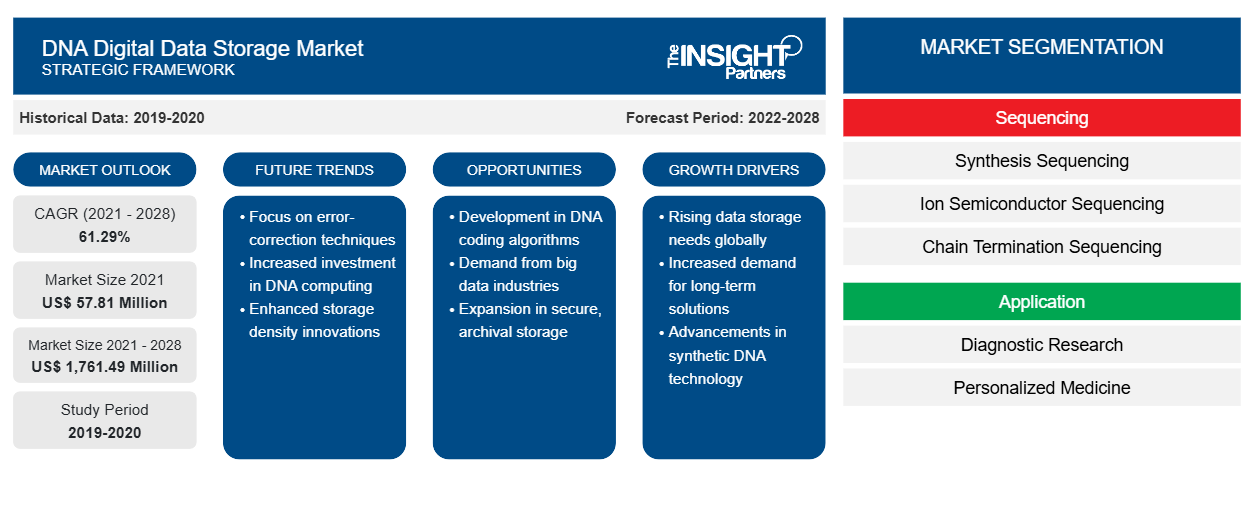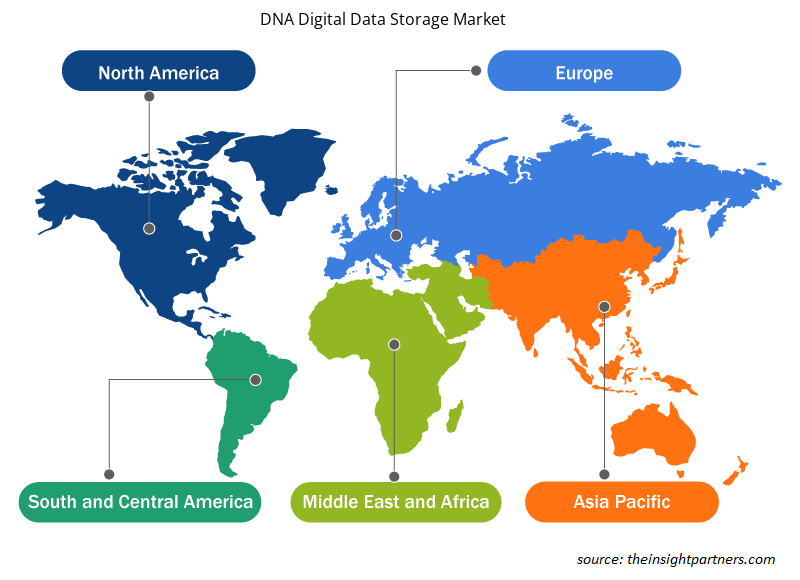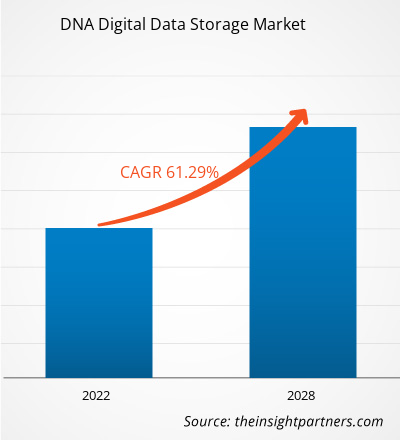The DNA digital data storage market is expected to grow from US$ 57.81 million in 2021 to US$ 1,761.49 million by 2028; it is estimated to grow at a CAGR of 61.29% during 2021 to 2028.
DNA digital data storage is the method of encoding and decoding binary data to and from synthesized strands of DNA. The DNA has garnered interest as a medium for digital information storage due to its high storage density and durability that is superior to those of existing silicon-based storage media. Moreover, DNA’s four-letter nucleotide code provides a suitable coding environment that can be used in the same way that computers and other electrical devices employ binary digital code to represent any letter, digit, or other character.
Customize This Report To Suit Your Requirement
You will get customization on any report - free of charge - including parts of this report, or country-level analysis, Excel Data pack, as well as avail great offers and discounts for start-ups & universities
DNA Digital Data Storage Market: Strategic Insights

- Get Top Key Market Trends of this report.This FREE sample will include data analysis, ranging from market trends to estimates and forecasts.
You will get customization on any report - free of charge - including parts of this report, or country-level analysis, Excel Data pack, as well as avail great offers and discounts for start-ups & universities
DNA Digital Data Storage Market: Strategic Insights

- Get Top Key Market Trends of this report.This FREE sample will include data analysis, ranging from market trends to estimates and forecasts.
Factors driving the growth of the global DNA digital data storage market are presence of DNA digital data storage service providers and active investments and business innovation related to DNA data storage are among the factors bolstering the market growth. However, the availability of alternatives and associated limitations are hindering the growth of the market. Despite these limitations, the increasing applications of DNA data storage would create a huge opportunity for the players operating in the DNA digital data storage market during the forecast period.
Market Insights
Increasing Applications of DNA Data Storage
DNA data storage is gaining popularity among healthcare and associated service providers. Forensics, personalized medicine, diagnostics, and others are a few areas of application of DNA data storage. DNA storage offers long-term data storage compared to the traditional modes of storage. The increasing demand for smaller data space to store larger amounts of data is expected to create opportunities for market players. DNA data storages are used and explored by pharmaceutical companies, research institutes, and security agencies to store maximum data in a smaller space.
There is a significant potential for product innovation and development as DNA storage technology is in the initial phase of development and not yet commercialized on a larger scale. Various companies and research organizations are actively involved in DNA storage development activities. For instance, in August 2021, the University of Washington and Microsoft researchers developed NANOPORE-TAL, which will enable cells to communicate with computers. Moreover, in 2021, Microsoft in joint collaboration with the University of Washington at the Molecular Information Laboratory, worked on a new chip to demonstrate the ability to pack DNA-synthesis spots three orders of magnitude more tightly and demonstrate higher DNA writing throughput. Thus, the rising applications of DNA data storage are expected to create lucrative opportunities for DNA digital data storage market players and other end users in the future.
Sequencing-Based Insights
The DNA digital data storage market, by sequencing, is segmented into synthesis sequencing, ion semiconductor sequencing, chain termination sequencing, ligation sequencing, nanopore sequencing. In 2021, the synthesis sequencing segment is likely to hold the largest share of the market. However, nanopore sequencing segment is expected to grow at the fastest rate during the coming years.
Application-Based Insights
The DNA digital data storage market, based on appplication is segmented into diagnostic research, personalized medicine, and others. The diagnostic research segment is likely to hold the largest share of the market in 2021 and is anticipated to register the highest CAGR in the market during the forecast period.
DNA Digital Data Storage Market Regional Insights
The regional trends and factors influencing the DNA Digital Data Storage Market throughout the forecast period have been thoroughly explained by the analysts at The Insight Partners. This section also discusses DNA Digital Data Storage Market segments and geography across North America, Europe, Asia Pacific, Middle East and Africa, and South and Central America.

- Get the Regional Specific Data for DNA Digital Data Storage Market
DNA Digital Data Storage Market Report Scope
| Report Attribute | Details |
|---|---|
| Market size in 2021 | US$ 57.81 Million |
| Market Size by 2028 | US$ 1,761.49 Million |
| Global CAGR (2021 - 2028) | 61.29% |
| Historical Data | 2019-2020 |
| Forecast period | 2022-2028 |
| Segments Covered |
By Sequencing
|
| Regions and Countries Covered | North America
|
| Market leaders and key company profiles |
DNA Digital Data Storage Market Players Density: Understanding Its Impact on Business Dynamics
The DNA Digital Data Storage Market is growing rapidly, driven by increasing end-user demand due to factors such as evolving consumer preferences, technological advancements, and greater awareness of the product's benefits. As demand rises, businesses are expanding their offerings, innovating to meet consumer needs, and capitalizing on emerging trends, which further fuels market growth.
Market players density refers to the distribution of firms or companies operating within a particular market or industry. It indicates how many competitors (market players) are present in a given market space relative to its size or total market value.
Major Companies operating in the DNA Digital Data Storage Market are:
- Illumina, Inc
- Twist Bioscience
- Agilent Technologies, Inc
- Molecular Assemblies
- Quantum Corporation
Disclaimer: The companies listed above are not ranked in any particular order.

- Get the DNA Digital Data Storage Market top key players overview
End User-Based Insights
The DNA digital data storage market, based on end user is segmented into academics and research institutes, pharmaceutical and biotechnology companies, hospitals and clinics, and others. The academics and research institutes segment is likely to hold the largest share of the market in 2021 and is anticipated to register the highest CAGR in the market during the forecast period
Product launches and approvals are commonly adopted strategies by companies to expand their global footprints and product portfolios. Moreover, the genome editing market market players focus on the partnership strategy to enlarge their clientele, which, in turn, permits them to maintain their brand name globally.
Company Profiles
- Illumina,Inc
- Twist Bioscience
- Agilent Technologies, Inc.
- Molecular Assemblies
- Quantum Corporation
- CATALOG
- Microsoft Corporation
- Iridia, Inc
- F. HOFFMANN-LA ROCHE LTD
- DNA Script
- Evonetix.
Frequently Asked Questions
Which is the most influencing segment growing in the DNA digital data storage market report?
The global DNA digital data storage market based on sequencing is segmented into, Synthesis Sequencing, Ion Semiconductor Sequencing, Chain Termination Sequencing, Ligation Sequencing, and Nanopore Sequencing. In 2021, the synthesis sequencing segment held the largest share of the market by technology whereas, nanopore sequencing is expected to witness fastest CAGR during 2021 to 2028, due to increasing utilization of this technology at global level.
What is the market value of DNA digital data storage market based on region?
The global DNA digital data storage market is segmented into North America, Europe, Asia Pacific, Middle East & Africa, and South & Central America. The North American area holds the largest market for DNA digital data storage. The United States held the most significant DNA digital data storage market and is expected to grow due to factors such as the transformation of digital healthcare and growing investments while the technological advancements by key players in DNA digital data storage is also boosting the growth rate in US.
The Asia Pacific region is expected to account for the fastest growth in the DNA digital data storage market. In Japan, India and South Korea, the market is expected to grow owing to the ongoing research activities related to DNA digital data storage and technology penetration in the region.
What are the factors impacting for the DNA Digital Data Storage market?
Several factors are believed to affect DNA digital data storage market in the coming years. Factors such as presence of DNA digital data storage service providers and active investments and business innovation related to DNA data storage are driving the market growth. However, the availability of alternatives and associated limitations likely to hamper the growth of the market.
Who are the major players in the DNA digital data storage market?
The DNA digital data storage market majorly consists of the players such as, Illumina, Inc; Twist Bioscience Agilent Technologies, Inc; Molecular Assemblies; Quantum Corporation; CATALOG; Microsoft Corporation; Iridia, Inc.; F. HOFFMANN-LA ROCHE LTD.; DNA Script; Evonetix among others.
What is DNA Digital Data Storage?
DNA digital data storage is the method of encoding and decoding binary data to and from synthesized strands of DNA. The DNA has garnered interest as a medium for digital information storage due to its high storage density and durability that is superior to those of existing silicon-based storage media. Moreover, DNA’s four-letter nucleotide code provides a suitable coding environment that can be used in the same way that computers and other electrical devices employ binary digital code to represent any letter, digit, or other character.
- Historical Analysis (2 Years), Base Year, Forecast (7 Years) with CAGR
- PEST and SWOT Analysis
- Market Size Value / Volume - Global, Regional, Country
- Industry and Competitive Landscape
- Excel Dataset
- Parking Meter Apps Market
- eSIM Market
- Advanced Distributed Management System Market
- Online Exam Proctoring Market
- Electronic Data Interchange Market
- Barcode Software Market
- Maritime Analytics Market
- Cloud Manufacturing Execution System (MES) Market
- Robotic Process Automation Market
- Digital Signature Market
Testimonials
Reason to Buy
- Informed Decision-Making
- Understanding Market Dynamics
- Competitive Analysis
- Identifying Emerging Markets
- Customer Insights
- Market Forecasts
- Risk Mitigation
- Boosting Operational Efficiency
- Strategic Planning
- Investment Justification
- Tracking Industry Innovations
- Aligning with Regulatory Trends
Yes! We provide a free sample of the report, which includes Report Scope (Table of Contents), report structure, and selected insights to help you assess the value of the full report. Please click on the "Download Sample" button or contact us to receive your copy.
Absolutely — analyst assistance is part of the package. You can connect with our analyst post-purchase to clarify report insights, methodology or discuss how the findings apply to your business needs.
Once your order is successfully placed, you will receive a confirmation email along with your invoice.
• For published reports: You’ll receive access to the report within 4–6 working hours via a secured email sent to your email.
• For upcoming reports: Your order will be recorded as a pre-booking. Our team will share the estimated release date and keep you informed of any updates. As soon as the report is published, it will be delivered to your registered email.
We offer customization options to align the report with your specific objectives. Whether you need deeper insights into a particular region, industry segment, competitor analysis, or data cut, our research team can tailor the report accordingly. Please share your requirements with us, and we’ll be happy to provide a customized proposal or scope.
The report is available in either PDF format or as an Excel dataset, depending on the license you choose.
The PDF version provides the full analysis and visuals in a ready-to-read format. The Excel dataset includes all underlying data tables for easy manipulation and further analysis.
Please review the license options at checkout or contact us to confirm which formats are included with your purchase.
Our payment process is fully secure and PCI-DSS compliant.
We use trusted and encrypted payment gateways to ensure that all transactions are protected with industry-standard SSL encryption. Your payment details are never stored on our servers and are handled securely by certified third-party processors.
You can make your purchase with confidence, knowing your personal and financial information is safe with us.
Yes, we do offer special pricing for bulk purchases.
If you're interested in purchasing multiple reports, we’re happy to provide a customized bundle offer or volume-based discount tailored to your needs. Please contact our sales team with the list of reports you’re considering, and we’ll share a personalized quote.
Yes, absolutely.
Our team is available to help you make an informed decision. Whether you have questions about the report’s scope, methodology, customization options, or which license suits you best, we’re here to assist. Please reach out to us at sales@theinsightpartners.com, and one of our representatives will get in touch promptly.
Yes, a billing invoice will be automatically generated and sent to your registered email upon successful completion of your purchase.
If you need the invoice in a specific format or require additional details (such as company name, GST, or VAT information), feel free to contact us, and we’ll be happy to assist.
Yes, certainly.
If you encounter any difficulties accessing or receiving your report, our support team is ready to assist you. Simply reach out to us via email or live chat with your order information, and we’ll ensure the issue is resolved quickly so you can access your report without interruption.















The List of Companies - DNA Digital Data Storage Market
- Illumina, Inc
- Twist Bioscience
- Agilent Technologies, Inc
- Molecular Assemblies
- Quantum Corporation
- CATALOG
- Microsoft Corporation
- Iridia, Inc.
- F. HOFFMANN-LA ROCHE LTD.
- DNA Script
- Evonetix






 Get Free Sample For
Get Free Sample For